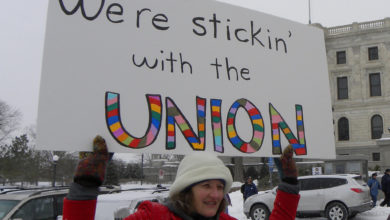 Photo: Don Emmert/AFP/Getty Images |
The Big Business imprint on the electoral outcome is total and complete. Kerry is the richest U.S. Senator. He and his wife are “worth” more than $747 million. Bush is from an “old money” oil and banking family, although he reports only $18.9 million in assets. Dick and Lynn Cheney have assets of more than $111 million, while John Edwards discloses $44.6 million in personal wealth.
It’s not just the vast personal wealth of the candidates that proves that they are all firmly in the back pockets of Big Business. A Sept. 7 Center for Public Integrity report showed that in the 2004 race, Bush and Kerry shared four of the same 10 largest donors, all of whom are big banks and financial corporations.
During the national presidential elections, the plutocratic character of the U.S. political system is fairly obvious. This fact often leads to all kinds of admonitions and liberal hand wringing about the role of Big Money in the political process. A liberal political program, in contrast to a revolutionary socialist program, appeals to the government to reform itself by curtailing the influence of Big Money. Communists and the liberals both see the same outward symptom of plutocracy. But their analysis of the problem-and most importantly, their solutions-are worlds apart.
The dictionary definition of plutocracy is: 1. Government by the wealthy. 2. A wealthy class that controls a government. 3. A government or state in which the wealthy rule.
There can be no argument that the U.S. political system fully conforms to this definition of a plutocracy. In fact, it is not just the rule of wealthy people. It is the rule of the wealthiest capitalist corporations and banks.
This can be demonstrated in a thousand ways. But since it is the election season, what better way to see the plutocracy than with a quick review of the biggest donors to the candidates. These donors contributed to-more accurately, invested in-both the Bush and Kerry campaign coffers.
The list, in order: Goldman Sachs, $4.7 million; National Association of Realtors, $3 million; Morgan Stanley, $2.5 million; Microsoft Corp., $2.4 million; Time Warner, $2.4 million; Citigroup, $2.1 million; National Beer Wholesalers Association, $2.1 million; UBS Americas, $1.9 million; SBC Communications, $1.9 million. The list goes on and on. Bank of America, Wal-Mart Stores, and JP Morgan Chase are among the other top 20 contributors. (Center for Responsive Politics, www.opensecrets.org)
Zip through the top 100 contributors, and one can see that with the exception of a handful of labor unions-who hope to stem the unadulterated political domination of the union-busting Republican Party-the chief campaign contributors make up the lion’s share of the top 100 of the Fortune 500.
Weapons manufacturers, banks, and media and entertainment monopolies, industrialist transnational corporations dominate a political system in which the presidential candidates in the 2000 election spent more than $1.2 billion. (Public Citizen) The final tally for the 2004 election will be higher.
Liberal versus communist outlook
The liberal and the communist can both easily see this reality-it is not really hidden at all. The candidates selected to vie with each other for the presidency obviously have to be acceptable to the wishes of the capitalist class if they want to compete. No candidate lacking corporate and banking sponsorship stands a chance. Unable to buy advertising time on the TV, radio and print media, the message of a truly progressive candidate is barely audible to the public. If candidates represent the working class and present a strong critique of capitalism, they will be either ignored or demonized by the media establishment-itself owned by the largest corporations and banks.
The liberal can see that the majority of working people are victimized by the political system. They are distraught by the absence of real democracy and are either despairing altogether or insisting that in spite of their “obvious flaws,” one of the capitalist candidates is a “lesser evil” and people should line up behind them. The liberal throws in this hopeful caveat: “If we can elect the lesser evil candidate, then they will be more likely to listen to us” as we advocate for this or that reform. The outer reach of the political program of the liberal is to appeal to the powers inside the capitalist political establishment to reform and do the right thing-to be more humane, less war-like, less racist, more inclusive, more democratic and on and on.
This was the perspective of some of the early socialists in the 19th century. Marx admired them and their idealistic perspectives of making the world a better place. But he labeled them “utopian socialists.” It was not that their ideals were not utopian-employment, equal rights for women, free public education, an end to war. What made them utopian, according to Marx and Engels, was their faith that the oppressors of society could be reasoned with and convinced that self-reform was the best path for all humanity. The utopians discounted the concept of class struggle and the possibility of anti-capitalist revolution.
The liberal sees the workers, the majority of the people, really only as victims of the plutocracy and its political system. The communist, on the contrary, sees the workers not simply as victims. They can see what the liberal can’t see, even though the class-conscious capitalist does. Revolutionary socialists and capitalists both understand the working class, once it is politically awakened and conscious of its position in society, can be quickly transformed from victim into the dominant power in politics and society. The working class can be the revolutionary transforming force in society-not simply a victim of the rich and powerful.
This is what the capitalists fear more than anything: the political awakening of the working people. They are aware that the workers are the majority. They know all too well that if workers’ discontent leads to political radicalization and to a militant mass movement, the domination of the plutocrats will be put to the ultimate test.
 The Party for Socialism and Liberation brought the message of class-conscious struggle to protests at both capitalist party conventions. Photo: Bill Hackwell |
The capitalist parties spend hundreds of millions of dollars each to prevent exactly that. The major media, the education system, and the politicians work non-stop to create a false consciousness among the people about every issue: the war in Iraq and Afghanistan, the stationing of U.S. troops in 130 countries in 750 military bases, the reason for growing poverty and unemployment, the role of the “free market” in condemning hundreds of millions of people to destitution, and more.
Both Bush and Kerry, true representatives of U.S. capitalism, tell the workers that “we” must prevail in Iraq. The “we” they refer to is the United States-really, a tiny fraction of this country’s elite. They are relying on well-trained patriotic reflexes to create a false consciousness among the workers. They can’t tell the truth about Iraq because the truth would lead to an uprising of the workers, including the young workers in uniform stationed in Iraq today.
Imagine what it would sound like: “On behalf of Exxon-Mobil, Texaco, Citibank, and JP Morgan Chase, among others, we have sent you to re-colonize Iraq and all of the Middle East. We intend to regain our undiluted control over this oil-rich area. The Soviet Union that acted as an ally of the Arab states is no more. Now we can try to turn the clock back 40 years, before the anti-colonial Arab revolutions swept away our puppet monarchies in the 1950s and 1960s. We want to return to the days when we derived over half of all our corporate overseas profits from these countries. All that talk about Saddam Hussein posing a nuclear threat was just to scare people into sending their family and friends to kill or to be killed.” That speech would be true-but no one who wants to serve the ruling class as president can actually tell the truth.
Within the capitalist plutocracy, elections and bourgeois democracy in general have as a fundamental social and political function, the role of preventing the growth of class consciousness among the working class. Workers are asked to buy into “our” political system, “our” democracy. As in the capitalist market itself, we are given the illusion of choice-when in reality, candidates from both major political parties are selected and vetted far from the view of the millions who cast votes.
Communists recognize the political elections as a form of class rule, not the expression of genuine or widespread democracy. In earlier social systems, for example during the entire feudal era, the kings and queens did not need to draw in the masses in the countryside. But modern capitalism created a new working class: the modern wage workers. Their slavery was disguised by the “free labor” system, where workers “choose” to sell their labor in order to live and provide for their families. (Of course, workers who choose to withhold their labor through strikes and protests meet the most severe repression.) The political system corresponds to the means of exploitation.
The tiny ruling class today depends on the labor of hundreds of millions for their profits and their rule. Workers’ collective action could shut down production and take over the employers’ factories and the governmental seat of power. It is not really possible to simply say to this discontented mass of concentrated urbanized workers, “Let them eat cake.”
Lenin discussed the role of bourgeois democracy in the context of the class struggle. “The mechanics of political democracy works in the same direction [as bribery]. Nothing in our times can be done without elections; nothing can be done without the masses. And in this era of printing [today, TV and the Internet] and parliamentarianism it is impossible to gain the following of the masses without a widely ramified, systematically managed, well-equipped system of flattery, lies, fraud, juggling with fashionable and popular catchwords, and promising all manner of reforms and blessings to the workers right and left-as long as they renounce the revolutionary struggle for the overthrow of the bourgeoisie.” (“Imperialism and the Split in Socialism,” 1916)
This is not to say that communists discount bourgeois elections altogether. In certain cases, elections can open a window into trends within the ruling class or within the working class. The March 2004 elections in Spain, which became a referendum on the Spanish government’s participation in the war in Iraq, were one such example. In other cases, communists may participate in bourgeois elections in order to win a hearing from wider sectors of the working class.
In the latest U.S. elections, the stakes for the ruling class were high. Hundreds of thousands had taken to the streets in the preceding year to protest the war in Iraq. Millions of workers are deeply skeptical about the war and about growing poverty and economic uncertainty.
The hundreds of millions of dollars that the capitalist class poured into these elections was an investment-but not an investment in one or another candidate. It was an investment in social peace, channeling discontent into the safe corridors of voting booths and away from the streets.
Millions of people were told: to defeat Bush, vote for Kerry. Those who peddled this line risk sowing disorientation (if Kerry wins and, as he promises, continues all major components of the Bush program) or demoralization if Kerry loses. Either result is a win for the capitalist class.
For socialists, the main task in the post-election period will be to put forward a clear program of class-conscious struggle against whichever president takes office.
An analysis of the results of the 2004 presidential elections will soon be available at www.socialismandliberation.org.






